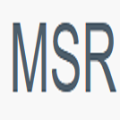Training deep neural networks (DNNs) under weak supervision has attracted increasing research attention as it can significantly reduce the annotation cost. However, labels from weak supervision can be noisy, and the high capacity of DNNs enables them to easily overfit the label noise, resulting in poor generalization. Recent methods leverage self-training to build noise-resistant models, in which a teacher trained under weak supervision is used to provide highly confident labels for teaching the students. Nevertheless, the teacher derived from such frameworks may have fitted a substantial amount of noise and therefore produce incorrect pseudo-labels with high confidence, leading to severe error propagation. In this work, we propose Meta Self-Refinement (MSR), a noise-resistant learning framework, to effectively combat label noise from weak supervision. Instead of relying on a fixed teacher trained with noisy labels, we encourage the teacher to refine its pseudo-labels. At each training step, MSR performs a meta gradient descent on the current mini-batch to maximize the student performance on a clean validation set. Extensive experimentation on eight NLP benchmarks demonstrates that MSR is robust against label noise in all settings and outperforms state-of-the-art methods by up to 11.4% in accuracy and 9.26% in F1 score.
翻译:深度神经网络(DNN)的弱监督训练已经引起了越来越多的研究关注,因为它可以显着降低注释成本。然而,弱监督标签可能会有噪声,在DNN的高容量下,很容易过度拟合标签噪声,导致泛化能力差。最近的方法利用自我训练构建噪声抗性模型,在这种框架下,以弱监督训练的教师为学生提供高度可信的标签。然而,从这样的框架中衍生出的教师可能已经适应了大量的噪声,因此会产生带有高置信度的错误伪标签,从而导致严重的错误传播。在本文中,我们提出了元元自我调节(MSR),一种噪声抗性的学习框架,以有效地对抗弱监督标签中的噪声。与依靠带有噪声标签的固定教师不同,我们鼓励教师改进伪标签。在每个训练步骤中,MSR在当前小批次中执行元梯度下降,以最大化学生在干净的验证集上的性能。对八个NLP基准进行广泛实验表明,MSR在所有设置中都对标签噪声具有鲁棒性,并且在准确度和F1得分上的表现超过了最先进的方法高达11.4%和9.26%。


